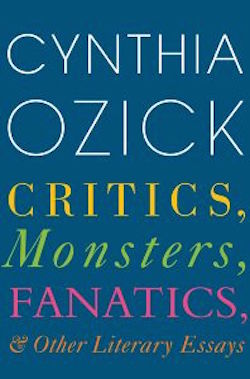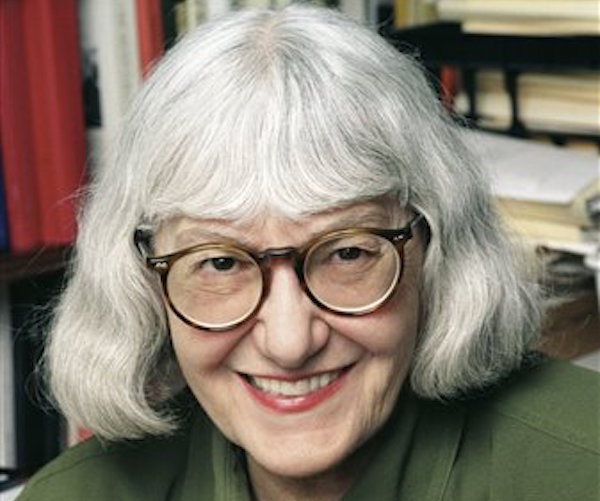Fuse Book Review: Cynthia Ozick — The Value of “Exaggerated Contempt”
For Cynthia Ozick, critics connect the dots; they inform us about what kind of culture we’re living in.
Critics, Monsters, Fanatics & Other Literary Essays by Cynthia Ozick. Houghton Mifflin Harcourt, 224 pages, $25.
By Harvey Blume

For reasons that elude me, I have never been a particular fan of Cynthia Ozick’s work, neither her fiction nor her criticism, but something in Zoe Heller’s put-down of Ozick’s new collection of essays, Critics, Monsters, Fanatics, And Other Literary Essays, in the NY Times Book Review made me bristle.
As it happened, I was dipping into Ozick’s book and found myself captivated. Though I have already found much to disagree with, and will likely find more, I am as taken by the suspenseful energy of the writing and thinking as I might be by the plot of a first-class thriller.
I’m thinking here of something by Martin Cruz Smith, for example, not necessarily his Gorky Park, by which he is best known, but perhaps his superb December 6, about World War II, as experienced by a young American in Tokyo, or his Wolves Eat Dogs, set in Chernobyl. Alan Furst seems to get automatic plaudits these days, as thriller writer cum historical novelist extraordinaire, but Furst is almost never as rewarding as Smith almost always is. Furst works with a set of stock characters, wan, sweet and melancholy in the face of Nazism; Smith burrows deeper, into varied historical circumstances.
But I digress. I make distinctions. I tend to judge, as you see, harshly.
Does this reflex make me a literary critic or merely a grouchy reviewer? Just as Heller says, Ozick builds a wall between the two, and polices it, writing that, “Reviewers are not merely critics of lesser degree, on the farther end of a spectrum. Critics belong to a whole distinct phylum. This is a phylum that, at present, hardly exists.”
For Ozick, critics are not only necessary for literature, for novelists in particular — criticism serves, for her, as the novel’s “ghostly twin” — but for the culture as a whole. They connect the dots; they inform us about what kind of culture we’re living in, and that it is an evolving culture, however disparate its unity. Edmund Wilson, par excellence, she thinks, fulfilled that kind of function, as did Lionel Trilling. Now Harold Bloom.
What bothers me about Ozick is not the distinction she makes but her limited purview. She mentions Jed Perl as a critic worthy of the name. That’s a bit sly on her part. Perl writes about the visual arts, not literature, but with the sort of wall-building severity that might have induced Ozick to include him. Much as I enjoy reading Perl, if I had to snark him down to an abiding essence it is that après Titian, le deluge, which is to say Duchamp, Warhol, and the exploding flotsam of an art market. If you dip into Ozick’s book you’d see why she might be drawn to that point of view, little as Perl pertains to literature.
It bothers me that Ozick seems not to have read Oliver Sacks, and probably never considered including him among her culture critics, though he read and wrote voluminously, and had immense influence on culture. In the same vein, I’d bet she’s never read Peter Kramer. She knows the culture has changed since the heyday of “the typewriter and the telephone booth and fedoras and stockings with seams” but she’s not reliable about how it changed. She’s aware of pixels but has seemingly never encountered Steven Pinker or Steven Jay Gould, good writers and culture critics, both of them.
Ozick does allude, briefly but well, in the context of a splendid essay about Kafka, to Walter Benjamin, but never follows up with a mention of Marshall McLuhan, the media and culture-making critic who succeeds him.

Cynthia Ozick. Photo: AP Photo/Houghton Mifflin Company, Nancy Crampton
I dislike her list of coming critics, and think she’s bluffing, when, for example, she includes Camille Paglia: when I think of Ozick reading Paglia I get a cartoon in my head of matter shaking hands with anti-matter. As for novelists, I think Ozick mistaken not to give Jonathan Lethem a nod, though she does fuss a bit about Jonathan Franzen. But for all my reservations about the Ozick canon, I have even more about Heller’s dismissal of this book on the grounds of Ozick’s “exaggerated contempt”
Heller does parenthetically allude to the fact that Ozick’s essays on “Bellow, Kafka, Trilling, Malamud, are all shrewd and engrossing.” To my mind, they are shrewd and engrossing to a degree that makes the book valuable whatever one’s caveats and grudges.
My suspicion is that Heller’s chief grudge against this book is that Ozick didn’t bring up Heller’s work even so much as to dismiss it. It’s therefore Heller’s “exaggerated contempt,” not Ozick’s, that troubles me.
Harvey Blume is an author—Ota Benga: The Pygmy At The Zoo—who has published essays, reviews, and interviews widely, in The New York Times, Boston Globe, Agni, The American Prospect, and The Forward, among other venues. His blog in progress, which will archive that material and be a platform for new, is here. He contributes regularly to The Arts Fuse, and wants to help it continue to grow into a critical voice to be reckoned with.
Tagged: And Other Literary Essays, Cynthia-Ozick, Fanatics, critics, literary-essays, monsters
